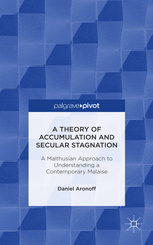A Theory of Accumulation and Secular Stagnation, 1st ed. 2016
Auteur : Aronoff Daniel

In A Theory of Accumulation and Secular Stagnation, Aronoff explores Malthus' ideas relating to secular stagnation and uses the insight gained to understand the origins of the subpar growth and tepid employment, periodically punctuated by booms, that has plagued the US economy since the turn of the millennium. He explains how the rise of mercantilism among Asian countries ? principally China ? and increased income concentration generated an upsurge in excess saving. This accumulation created a chronic deficiency in demand while also depressing interest rates, which generated a search for yield that fuelled periodic booms.
Daniel Aronoff is President of Landon Companies, USA. He has served as Vice Chairman of the Board of Trustees of Grand Valley State University, USA. Throughout several decades of participation in the professional world, Aronoff has been a frequent contributor to many media outlets including the Financial Times.
Date de parution : 12-2015
Ouvrage de 136 p.
14x21.6 cm
Thèmes d’A Theory of Accumulation and Secular Stagnation :
Mots-clés :
financial crisis; US financial crisis; housing boom; US housing boom; debt deflation; secular stagnation; accumulation; economic cycles; volatility; current account deficit; capital flow bonanza; mercantilism; China US trade; US China trade; income concentration; China savings; leverage; credit boom; unemployment; Malthus; crisis; Deflation; economics; employment; growth; inequality; interest rates; John Maynard Keynes; Keynes; macroeconomics; production; Stagnation; trade



